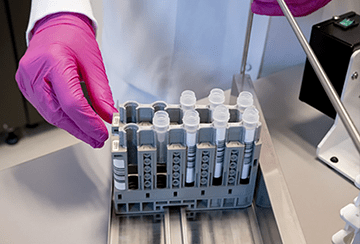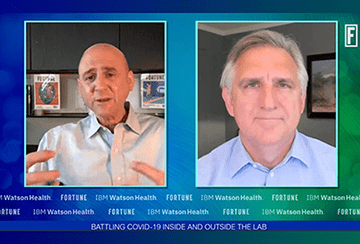At the annual STAT Summit and the Conference of Paris, Amgen CEO Bob Bradway hailed progress by the biopharmaceutical industry against COVID-19 and highlighted Amgen’s ongoing commitment to fighting lung cancer and many other serious diseases.
Speaking at the STAT Summit on November 18, Bradway noted the unprecedented speed and collaboration that biopharmaceutical companies have shown in developing new vaccines and therapeutics for COVID-19.
"It’s an encouraging picture," he commented, "and the results so far look spectacular." Noting that two new vaccine candidates for COVID-19 have shown 95% efficacy in large-scale clinical trials, Bradway expressed confidence "that the light we can now see at the end of the tunnel is daylight and not an oncoming train."
Bradway praised regulatory authorities around the world for their openness to new forms of interaction between biopharmaceutical companies, physicians and clinical trial participants that has helped to accelerate progress. He expressed hope that new telehealth procedures will prove to be relevant to the treatment of chronic conditions such as heart disease, and he called upon payors to continue reimbursing virtual physician-patient interactions even after the pandemic has ended.
Commenting on strong investor interest in the biotech sector, Bradway observed that massive fiscal stimulus has increased the capital available for investment, while ultra-low interest rates have led many to search for high risk/high return opportunities. While huge capital inflows into biotech permit companies to fund exciting new research, they can also produce inefficiency as researchers pursue the same therapeutic targets. Bradway cited as examples the more than 150 different checkpoint inhibitors currently in development for cancer, as well as the hundreds of new vaccines and therapeutics being studied for COVID-19. "Not all of these will succeed," he stated, "and the consequence will be considerable capital destruction."
Bradway was joined on the STAT Summit "Biotech 2021" panel by Reshma Kewalramani, CEO and President of Vertex Pharmaceuticals, and Ted W. Love, CEO and President of Global Blood Therapeutics. The session was moderated by STAT biotech senior writer Adam Feuerstein.
One week earlier, Bradway participated in a panel examining the "Next Era in Healthcare" at the annual "Conference of Paris," organized by the International Economic Forum of the Americas. He and fellow panelist Stanley M. Bergman, Chairman and CEO of Henry Schein, discussed the need for healthcare systems to focus more on predicting and preventing chronic disease once the COVID-19 pandemic begins to recede. "Especially during COVID-19," Bradway commented, "many people with chronic conditions have delayed or skipped doctor visits, or have interrupted taking their prescribed medicines. As we come out of this crisis, we need to do a better job of predicting who is most at risk of chronic disease and preventing disease by ensuring that people can obtain the chronic therapies they need."
Bradway observed that the pandemic has increased financial pressures on health systems around the world. "Against that backdrop," he added, "we can no longer afford to waste money on treating heart attacks or strokes that could have been prevented in the first place."
Asked about racial and ethnic disparities in health care, Bradway noted that Amgen is improving the diversity of participants in its clinical trials, and that PhRMA has developed new principles for ensuring diversity in clinical research. "For historical reasons, parts of our society either haven’t had access to our trials or have been hesitant to participate," Bradway noted. "We have to understand the causes and find solutions." He added that "we can’t ignore the fact that our Black and Hispanic fellow citizens in the United States have borne a disproportionate share of the COVID-19 burden. We need to do more to understand the reasons for that disparate impact and to develop remedies to address it."




